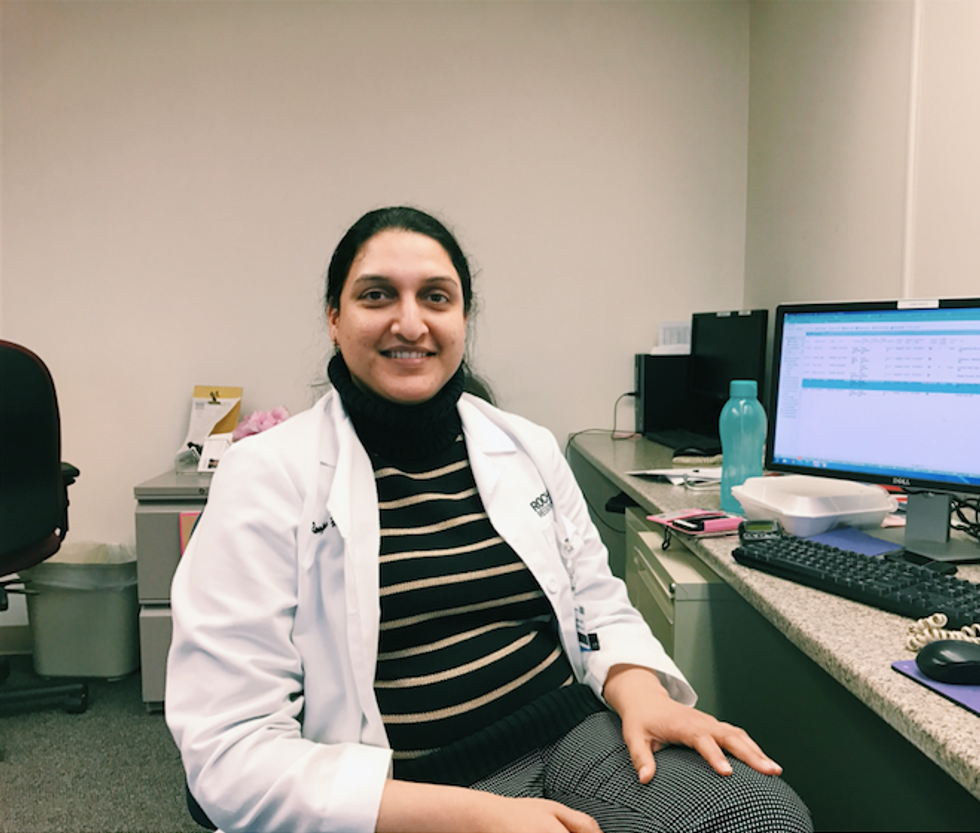During the mid-semester break, I had the wonderful opportunity to shadow Dr. Roopa Yarlagadda from Rochester General Hospital for a week. Going in, I wanted to learn the ins and outs of the daily life of a physician: how they deal with patients, difficult cases, and interactions. Not only did I learn all those aspects, but also learned more about Dr. Yarlagadda. It's always very inspiring to see someone living their dream everyday, and more importantly, the journey and the hardships they faced to get to where they are today. On my last day I got to sit down with Dr. Y and interview her about her journey into the Medical field.
1. Why did you choose this career and why Internal Medicine?
I always wanted to go a field that is very well respected and my dream was to become a doctor from the very beginning; also I wanted to be the first one in my family to pursue a career in the medical field and with their constant support I was able to achieve it. Internal medicine is a specialty that branches out into every field and it requires knowledge from all sorts of other medical areas ex: cardiology, pulmonology, Oncology etc.. There's no fixed area that we have to know, you can take care of any individual regardless of their problem.
2. What is your background as a doctor: education and experience. What are your specialties/ expertise?
I did MBBS in Kakinada India, then did residency in Unity Hospitalist in Internal Medicine, and now I work as a hospitalist for RGH; I’m specialized to take care of patients admitted in hospital. When they’re sick they’re scared and anxious. I have to guide them through and make them feel better; it gives you a mental satisfaction knowing I helped them through this difficult path.
3. How do you handle workload stress and Emergency situations?
In this field you never know when there's going to be an emergency. It's a balance. It's all about the perspective; Stress is good. It makes you do things faster, but you need to balance it. Stress shouldn't drag you down in a negative way and it should lead a positive outcome. It gets better with time and the more you are being challenged the better. As I said, it's all about perspective.
4. Describe your day to day activities, priorities, and tasks
My number one priority are my kids and then my work. During my work obviously it's my patients; their safety and well being are my number one concern and it's my job to make them feel better.
5. Describe your most successful accomplishments
When I look back at my career, I accomplished a few things, but there is so much more. My first accomplishment was becoming a doctor and doing something I love everyday. There's always so much more knowledge to acquire and always a lot more room to grow.
5. What are your key challenges in the medical field?
It's the multitude of patient problems and the communication between the patient and their family. The main adversity I encounter is the transition between hospital care to home care.
6. What was it like doing residency?
During residency I didn't just learn a lot about academics, but also grew personally and learned a lot more about myself. In the time of residency you learn to work harder, think in more perceptions, and it makes you tough mentally. You're being critiqued and evaluated every month by different people who have been working in this field for long periods of time. Residency brings out your full potential and makes you the best doctor you can be.
7. What do you love about your job?
Honestly it was just taking care of the patients, the mental satisfaction you get from helping someone and giving someone a second chance is what makes it worth it.
8. What advice would you give someone who wants to pursue a career in medicine?
In this country anyone can be anything they want to be unless they give up hope. Nobody can stop them from being what they want to be expect themselves. Just have hope and believe.
9. What legacy do you want to leave?
I want to be remembered as a good and efficient clinician and that I made that all my patients feel better.
10. What do you do in order to mentally separate yourself from your job?
Coming home to my kids is a big relaxation for me. Of course a few of the patients I have and if any of them are in a critical condition they're always in the back of my head; I try not to stress too much though. Being a hospitalist, we don't see the same patients for long periods of time, so you don't have the luxury to get attached to them. Most scenarios they come for a specific problem and after I see them they either get discharged or transferred to another floor. But its the satisfaction that you get knowing that you made someone feel better during the most critical time in their life and that I made them feel better.






















